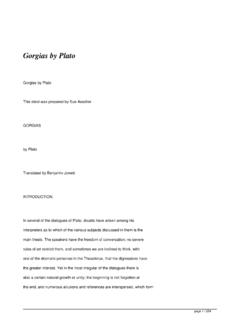Transcription of Bulfinch's Mythology by Thomas Bulfinch - Full Text Archive
1 Bulfinch 's Mythology by Thomas BulfinchBulfinch's Mythology by Thomas BulfinchRobert Rowe, Charles Franks and the Online Distributed Proofreading 'S MYTHOLOGYTHE AGE OF FABLETHE AGE OF CHIVALRYLEGENDS OF CHARLEMAGNEBY Thomas BULFINCHCOMPLETE IN ONE VOLUME[Editor's Note: The etext contains all three sections.]page 1 / ' PREFACENo new edition of Bulfinch 's classic work can be consideredcomplete without some notice of the American scholar to whose wideerudition and painstaking care it stands as a perpetual monument."The Age of Fable" has come to be ranked with older books like"Pilgrim's Progress," "Gulliver's Travels," "The Arabian Nights,""Robinson Crusoe," and five or six other productions of world-widerenown as a work with which every one must claim some acquaintancebefore his education can be called really complete.
2 Many readersof the present edition will probably recall coming in contact withthe work as children, and, it may be added, will no doubt discoverfrom a fresh perusal the source of numerous bits of knowledge thathave remained stored in their minds since those early years. Yetto the majority of this great circle of readers and students thename Bulfinch in itself has no Bulfinch was a native of Boston, Mass., where he was bornin 1796. His boyhood was spent in that city, and he prepared forcollege in the Boston schools. He finished his scholastic trainingat Harvard College, and after taking his degree was for a period ateacher in his home city. For a long time later in life he wasemployed as an accountant in the Boston Merchants' Bank.
3 Hisleisure time he used for further pursuit of the classical studieswhich he had begun at Harvard, and his chief pleasure in life layin writing out the results of his reading, in simple, condensedform for young or busy readers. The plan he followed in this work,page 2 / give it the greatest possible usefulness, is set forth in theAuthor's Preface."Age of Fable," First Edition, 1855; "The Age of Chivalry," 1858;"The Boy Inventor," 1860; "Legends of Charlemagne, or Romance ofthe Middle Ages," 1863; "Poetry of the Age of Fable," 1863;"Oregon and Eldorado, or Romance of the Rivers," this complete edition of his mythological and legendary lore"The Age of Fable," "The Age of Chivalry," and "Legends ofCharlemagne" are included. Scrupulous care has been taken tofollow the original text of Bulfinch , but attention should becalled to some additional sections which have been inserted to addto the rounded completeness of the work, and which the publishersbelieve would meet with the sanction of the author himself, as inno way intruding upon his original plan but simply carrying it outin more complete detail.
4 The section on Northern Mythology hasbeen enlarged by a retelling of the epic of the "Nibelungen Lied,"together with a summary of Wagner's version of the legend in hisseries of music-dramas. Under the head of "Hero Myths of theBritish Race" have been included outlines of the stories ofBeowulf, Cuchulain, Hereward the Wake, and Robin Hood. Of theverse extracts which occur throughout the text, thirty or morehave been added from literature which has appeared sinceBulfinch's time, extracts that he would have been likely to quotehad he personally supervised the new 3 / , the index has been thoroughly overhauled and, indeed,remade. All the proper names in the work have been entered, withreferences to the pages where they occur, and a conciseexplanation or definition of each has been given.
5 Thus what was amere list of names in the original has been enlarged into a smallclassical and mythological dictionary, which it is hoped willprove valuable for reference purposes not necessarily connectedwith "The Age of Fable."Acknowledgments are due the writings of Dr. Oliver Huckel forinformation on the point of Wagner's rendering of the Nibelungenlegend, and M. I. Ebbutt's authoritative volume on "Hero Myths andLegends of the British Race," from which much of the informationconcerning the British heroes has been obtainedAUTHOR'S PREFACEIf no other knowledge deserves to be called useful but that whichhelps to enlarge our possessions or to raise our station insociety, then Mythology has no claim to the appellation. But ifthat which tends to make us happier and better can be calleduseful, then we claim that epithet for our subject.
6 For Mythologyis the handmaid of literature; and literature is one of the bestallies of virtue and promoters of 4 / a knowledge of Mythology much of the elegant literature ofour own language cannot be understood and appreciated. When Byroncalls Rome "the Niobe of nations," or says of Venice, "She looks aSea-Cybele fresh from ocean," he calls up to the mind of onefamiliar with our subject, illustrations more vivid and strikingthan the pencil could furnish, but which are lost to the readerignorant of Mythology . Milton abounds in similar allusions. Theshort poem "Comus" contains more than thirty such, and the ode "Onthe Morning of the Nativity" half as many. Through "Paradise Lost"they are scattered profusely. This is one reason why we often hearpersons by no means illiterate say that they cannot enjoy were these persons to add to their more solid acquirements theeasy learning of this little volume, much of the poetry of Miltonwhich has appeared to them "harsh and crabbed" would be found"musical as is Apollo's lute.
7 " Our citations, taken from more thantwenty-five poets, from Spenser to Longfellow, will show howgeneral has been the practice of borrowing illustrations prose writers also avail themselves of the same source ofelegant and suggestive illustration. One can hardly take up anumber of the "Edinburgh" or "Quarterly Review" without meetingwith instances. In Macaulay's article on Milton there are how is Mythology to be taught to one who does not learn itpage 5 / the medium of the languages of Greece and Rome? To devotestudy to a species of learning which relates wholly to falsemarvels and obsolete faiths is not to be expected of the generalreader in a practical age like this. The time even of the young isclaimed by so many sciences of facts and things that little can bespared for set treatises on a science of mere may not the requisite knowledge of the subject be acquired byreading the ancient poets in translations?
8 We reply, the field istoo extensive for a preparatory course; and these verytranslations require some previous knowledge of the subject tomake them intelligible. Let any one who doubts it read the firstpage of the "Aeneid," and see what he can make of "the hatred ofJuno," the "decree of the Parcae," the "judgment of Paris," andthe "honors of Ganymede," without this we be told that answers to such queries may be found innotes, or by a reference to the Classical Dictionary? We reply,the interruption of one's reading by either process is so annoyingthat most readers prefer to let an allusion pass unapprehendedrather than submit to it. Moreover, such sources give us only thedry facts without any of the charm of the original narrative; andwhat is a poetical myth when stripped of its poetry?
9 The story ofCeyx and Halcyone, which fills a chapter in our book , occupies buteight lines in the best (Smith's) Classical Dictionary; and so 6 / work is an attempt to solve this problem, by telling thestories of Mythology in such a manner as to make them a source ofamusement. We have endeavored to tell them correctly, according tothe ancient authorities, so that when the reader finds themreferred to he may not be at a loss to recognize the we hope to teach Mythology not as a study, but as arelaxation from study; to give our work the charm of a story- book ,yet by means of it to impart a knowledge of an important branch ofeducation. The index at the end will adapt it to the purposes ofreference, and make it a Classical Dictionary for the of the classical legends in "Stories of Gods and Heroes" arederived from Ovid and Virgil.
10 They are not literally translated,for, in the author's opinion, poetry translated into literal proseis very unattractive reading. Neither are they in verse, as wellfor other reasons as from a conviction that to translatefaithfully under all the embarrassments of rhyme and measure isimpossible. The attempt has been made to tell the stories inprose, preserving so much of the poetry as resides in the thoughtsand is separable from the language itself, and omitting thoseamplifications which are not suited to the altered Northern mythological stories are copied with some abridgmentfrom Mallet's "Northern Antiquities." These chapters, with thoseon Oriental and egyptian Mythology , seemed necessary to completethe subject, though it is believed these topics have not usuallypage 7 / presented in the same volume with the classical poetical citations so freely introduced are expected to answerseveral valuable purposes.

![10,000 Dreams Interpreted [Or. . .'What's In A Dream'] [Or ...](/cache/preview/a/5/b/6/0/8/1/d/thumb-a5b6081da886dc42daeb3aaaa5f4e65d.jpg)








